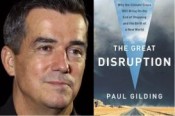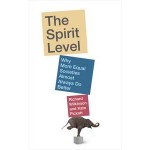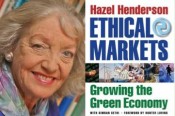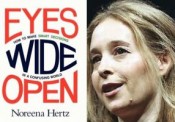Q&A: PAUL GILDING – Author, THE GREAT DISRUPTION
Written on October 2nd, 2014 |
Aired 06/10/12
PAUL GILDING says it’s time to stop worrying about climate change. We need instead to brace for impact because global crisis is no longer avoidable. He believes this Great Disruption started in 2008, with spiking food and oil prices and melting ice caps. It is not simply about fossil fuels and carbon footprints. We have come to the end of Economic Growth, Version 1.0, a world economy based on consumption and waste, where we lived beyond the means of our planet’s ecosystems and resources
According to Gilding, the coming decades will see loss, suffering, and conflict as our planetary overdraft is paid; however, they will also bring out the best humanity can offer: compassion, innovation, resilience, and adaptability.
Gilding says we must fight-and win-what he calls The One Degree War to prevent catastrophic warming of the earth. He believes the crisis offers us a chance to replace our addiction to growth with an ethic of sustainability, and an unmatched business opportunity as old industries collapse and new companies reshape our economy. In the aftermath of the Great Disruption, we will measure “growth” not by quantity of stuff but quality of life.
PAUL GILDING is an independent writer, advisor and advocate for action on climate change and sustainability. He has been involved with and led activist campaigns on a wide variety of social and environmental issues and served as Executive Director, Greenpeace Australia and Greenpeace International. Gilding founded Ecos Corporation in 1995, consulting to some of the world’s largest corporations on issues of sustainability until its sale in 2008. His first book is THE GREAT DISRUPTION: Why the Climate Crisis will Bring on the End of Shopping and the Birth of a New World.
Q&A: ROBERT JOHNSON, (INET)
Written on September 9th, 2014 |
Q&A: RICHARD WILKINSON & KATE PICKETT, Authors – The Spirit Level: Why More Equal Societies Almost Always Do Better
Written on March 2nd, 2014 |
Originally Aired: 01/31/10
RICHARD WILKINSON & KATE PICKETT authors of an important new book: The Spirit Level: Why More Equal Societies Almost Always Do Better
In the UK, the Guardian says The Spirit Level “might be the most important book of the year, and The New Statesman named it one of the top ten books of the past decade.
Based on thirty years’ research, The Spirit Level shows that unequal societies are bad for the well-off as well as the poor, when it comes to health and social problems, child well being, life expectancy, infant mortality, obesity, educational scores, drop out rates, illegal drug use, mental illness, homicide, incarceration, CO2 emissions, recycling, social mobility, innovation, and levels of trust.
The good news: If all these ills are related to one measure – income inequality, then, decreasing inequality should be the central goal of our politics because we can be confident that it works.
RICHARD WILKINSON has played a leading role in international research on inequality. He studied economic history at the London School of Economics before training in epidemiology, and is Professor Emeritus at the University of Nottingham Medical School and Honorary Professor at University College London.
KATE PICKETT is a senior lecturer at the University of York and a National Institute for Health Research Career Scientist. She studied physical anthropology at Cambridge, nutritional sciences at Cornell and epidemiology at Berkeley before spending four years as an Assistant Professor at the University of Chicago.
Free Forum Q&A- HAZEL HENDERSON, Ethical Markets Can We Still Solve Big Problems?-Part2
Written on January 29th, 2014 |
Aired: 1/26/14
As we begin a new year, let’s look at where we are in the big picture. What are the most critical issues facing the US and the world? How do you see things moving in those areas? How are things getting worse or better? What should we be keeping our eyes on in the year to come?
My guest this week will be HAZEL HENDERSON, who’s been asking these sorts of questions for at least the last 40 years. We’re going to approach this exploration globally as well as nationally, with a long-term view, and with an eye toward relationships and systems that we often miss in our day-to-day focus on the latest news and events.
If this sounds familiar, it’s because this was my plan a few weeks ago when Hazel was my guest. But we ended up spending so much time on her journey – a remarkable journey it is, a mom in New York who’d never been to college got upset about pollution threatening her young child, became an activist, and developed into a global expert on economics and sustainability.
Free Forum Q&A- NOREENA HERTZ, Eyes Wide Open: How to Make Smart Decisions in a Confusing World
Written on January 14th, 2014 |
Aired: 1/13/14
According to NOREENA HERTZ, we to make up to 10,000 trivial decisions every single day, 227 just about food. Caffeinated or decaf? Small, medium, large or extra large? Colombian, Ecuadorian, Ethiopian? Hazelnut, vanilla or unflavored? Cream or milk? Sugar or sweetener? If you make the wrong choice when it comes to your coffee, it doesn’t matter very much. But make the wrong choice when it comes to your finances, your health, or work, and you could end up sicker, poorer, or without a job.
NOREENA has been a guest on this show on her earlier books. But they were both about global economics. Her new book, Eyes Wide Open is sub-titled How to Make Smart Decisions in a Confusing World, and you can bet I’m going to ask Noreena how she decided on such a departure. In any case, I think this is a welcome subject as we face the choices of a new year, and I hope you’ll decide to tune in.
